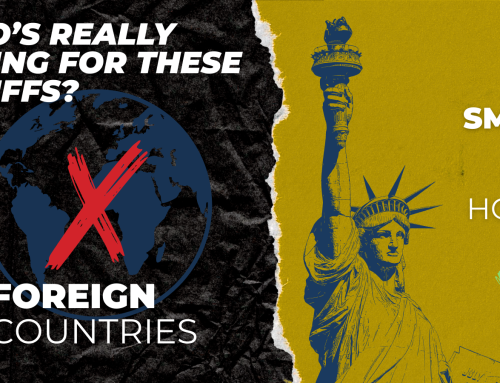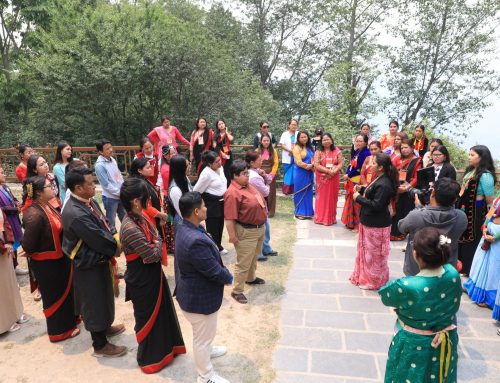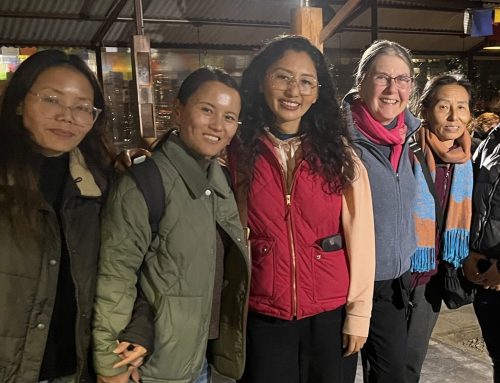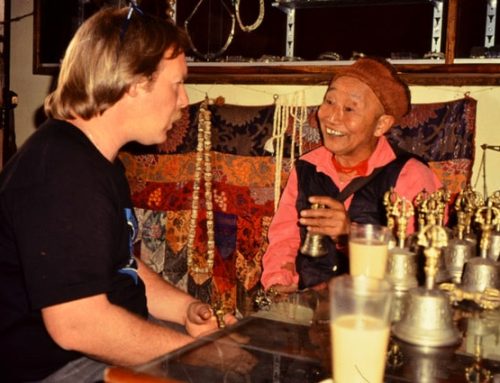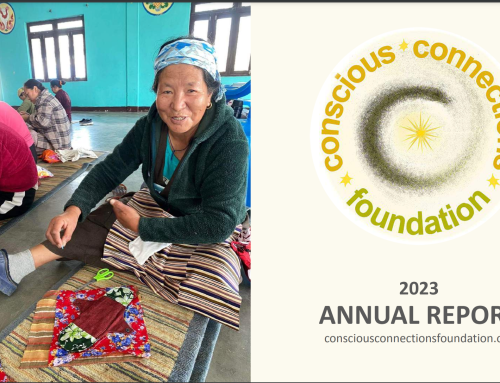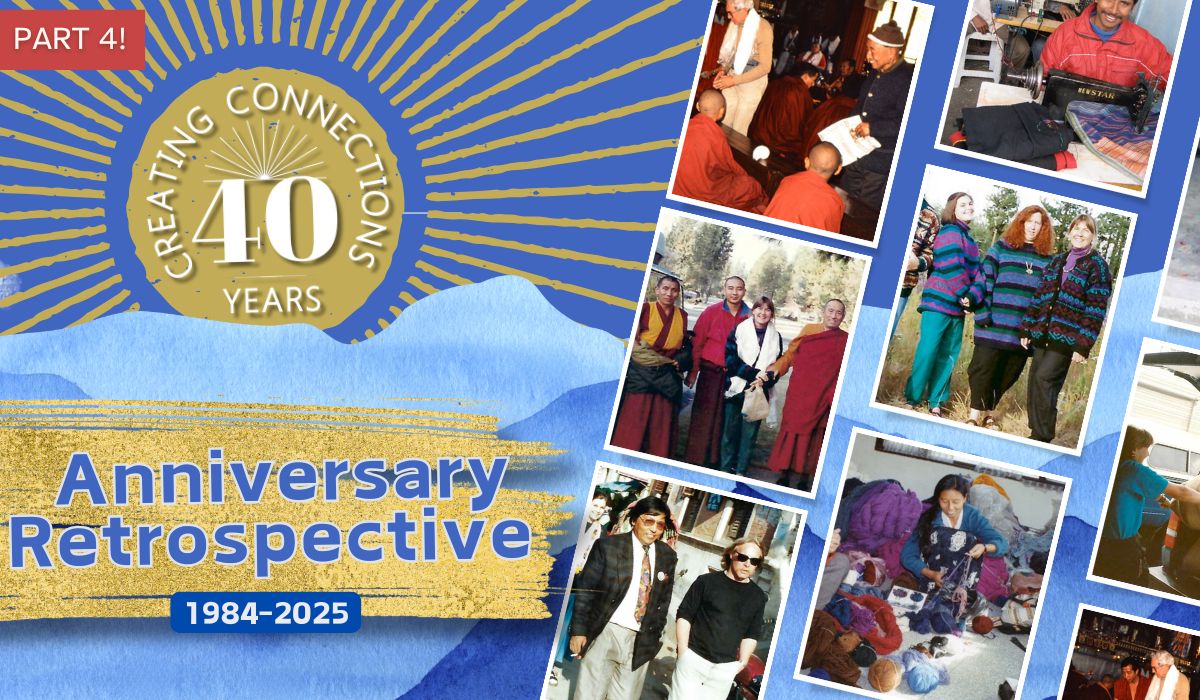
Part 4 of the 40th Anniversary Series: Another Day, Another Rupee
Written by Ric Connor, Co-Founder of Ganesh Himal Trading
The last installment of the Ganesh saga ended with Denise and Ram leaving Nepal after the King had abdicated and agreed to allow a multi party constitutional monarchy. This unfortunately was the beginning of a difficult transition period for the country. Beginning in 1991 various factions fought for control and political dominance. The most prominent of these were the Nepali Congress Party and the Maoist party, unfortunately a poorly advised name as the party had nothing to do with China. But they could be violent and disruptive, both in the countryside and the city. Calls for general strikes were increasingly frequent as mobs of maoists roamed through the streets ensuring all shops were closed under penalty of beatings and lootings.
By 1992 there were disruptions in the country as promised land reforms didn’t occur and the landless began organizing their own land reform. I’m not sure very many people actually understood what was happening. But it was the start of a frightening time. The people we worked with just wanted to get on with their business and be left alone. Business did continue, with some difficulty. By 1996 privately owned small factories, places that employed non-owners, were harassed and made to shut down. Pemala and Namgyal’s small facility where much of the clothing was sewn was targeted and told to shut down. There might have been a dozen people sewing there but to the maoists it was bourgeois and exploitative. When they came to shut it down, the people sewing said you can’t shut us down because we are all owners. Pemala had made them all partners in the profit sharing. Many of the tailors were from the village so when they came for work Pemala gave them a place to stay and provided them with food as well. Many workers are not treated well in Nepal, but those working in fair trade businesses are more than happy to be where they are.
The Nepali Congress party was in power and repressed much of the chaos, but those that suffered at the hands of the government became more radicalized and more emboldened in their attempts to take power. So it was in this unsettled time we decided to take Denise’s parents and Kira, age 13, to Nepal. Actually things were relatively calm for the most part so, what could go wrong. Wayne, Kira, Denise and I planned to trek to Everest Base Camp with Ram but as it would happen Joy fell off a step at the hotel the first morning and broke her leg. Not a serious break, more of a hairline fracture, but she also sprained both ankles. So she literally did not have a leg to stand on. Of course that ended Wayne’s trek but off we went on a white knuckle flight to Lukla, a two day walk from Namche Bazar and a week from base camp. The weather was not good, a blizzard was forecast by the time we got to Namche so we took the last room at the inn, which was in the basement and wickedly cold. As the blizzard settled in Denise started a major fever, shivering and sweating in our freezer of a room. During the day we would go upstairs and huddle around propane heaters eating snickers bars and allu fry fry; french fries, while watching it snow. Other trekkers would drag themselves in on their way down from base camp half frozen and covered with snow. The storm broke after a couple days and the proprietor of the lodge, a legend himself, told Kira she had to at least see Everest. We hiked up to the top of the circ where Namche sits. The view was spectacular, the Himalayas poking out of the fresh snow and Everest in the background, unforgettable. But we could go no further with the snow and Denise wheezing away. And it gets better!

Namgyal’s father, Wayne and monks at the offering in the monastery
Two days down to Lukla, we managed to get a flight to Kathmandu where there was another strike so no taxis were running. Doing what was called gaon co trekking, town trekking, we hoofed it back to Thamel. Only to find out that Wayne’s sister in Kansas was not expected to live through the night. The story actually gets more complicated as Joy wasn’t going anywhere fast and a funeral was planned in Kansas for the following week. But Pala, Namgyal’s father, arranged a major offering for her at his monastery. So with a borrowed wheelchair for Joy and fist full of rupes we went up to the monastery as the monks lit a thousand butter lamps, recited prayers, white washed Swayambhu temple and hung hundreds of new prayer flags, all for Wayne’s sister’s passage. This is rarely done and maybe had never been done for a Westerner. The other bright spot from all of this is that Joy offered to bring Chunta back to Spokane to help her as she mended. Chunta had been instrumental in caring for Joy in Kathmandu, although truthfully so many of our friends had as well, bringing her bone soup to help her heal and spending time with her as she was confined to her second story room.

Chunta and Pemala organizing sample products
All these seeming unfortunate events actually had a major positive impact on Ganesh Himal. Chunta spent six months in Spokane, tending to Joy but also imbedding herself into the work of Ganesh. We were still marketing mostly through festivals and colleges. I would go one way and Denise and Chunta another. She was invaluable when the shipments arrived, sorting and organizing and learning about the producers and the products. Thus began our long and fruitful relationship. It’s not a stretch to say as a business we would not be where we are without her. She has taken over all the managerial aspects of getting products together in Kathmandu, producers paid, orders out and invoices tabulated. Besides being incredibly organized Chunta is also very creative in helping both Denise and the craft producers develop fun new products and designs. It’s not easy to work in Nepal, especially with as many groups as we are associated with. There are many different castes, languages and small family businesses, some of whom don’t speak English or have little knowledge of finances or business skills. But what they are great at is their craft, whether it be weaving, block printing, paper making, knitting, sewing, silversmithing etc. Organizing all these various groups of people would be impossible if it were not for Chunta’s ability to communicate with respect and complete honesty in a variety of languages. But I get ahead of myself here.
At this point we were primarily a retail business, which gave us the opportunity to talk directly with customers, at festivals and at colleges, about the history of Tibet and the people we worked with in Nepal. But we were also still in the process of building our house while living in it. It was one long learning curve, but as with Ganesh it was a fly by the seat of your pants operation. As shipments of sweaters would arrive we would drive to Seattle to pick them up, cram the burlap bales into our van and unload them into Denise’s parents basement. They were extremely tolerant.
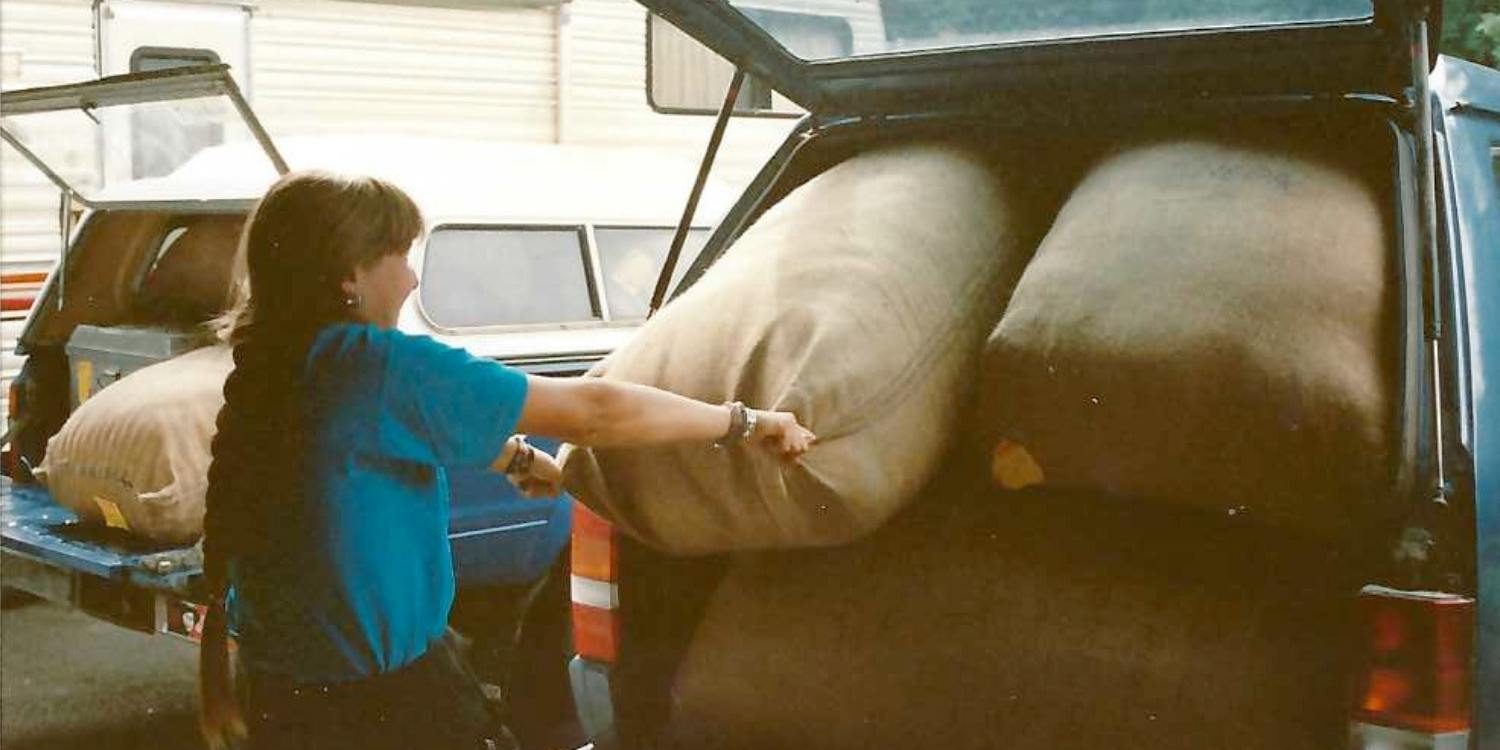
Denise transporting products to Spokane
It was also at this time that Denise and I became involved with the Tibetan Rights Campaign. The main organizer, Kunsang, was in Seattle, but we were active in Spokane in promoting Tibetan culture and history and helping people understand the Tibetan diaspora. Through TRC we had the opportunity to host a group of monks from the Drepung Loseling monastery in South India where they had relocated after China invaded Tibet. They were on a tour to raise money for the monastery, for refugees flooding into the monasteries and to promote Tibetan culture. The tour was arranged around performances where the monks would enact rituals with traditional music, chanting, dance and debate. The funny thing was that they were in Canada and we were asked to escort them across the border. They were coming from Nelson BC. It was night when we crossed at a small border station just north of Spokane. A dozen non english speaking monks were packed inside a van which was pulling a trailer loaded with costumes and instruments. The border agent came out, opened the door of the van and saw a dozen smiling Tibetan monks in robes looking back at him. He was a little shocked. I’m sure he had never encountered anything like this before but he took all their passports, processed them, and we were on our way.

Tibetan Monks arriving in Spokane
Their performance was held at St John’s cathedral, a marvelous Episcopal cathedral known in Spokane for having a more liberal congregation. It has seating for around nine hundred people. As we sold advanced tickets we figured if we got a couple hundred that would be great. The evening ended up being standing room only and was covered by media outlets across Spokane. The monks were floored, not just because of how much they had raised for their Monastery but by the reception they were given in Spokane. And guess where they stayed, Denise’s parents house!
This was actually the first of several groups of monks we hosted in Spokane over the years and each time the events were packed. In 1993 we were invited to attend a teaching by His Holiness the Dalai Lama in Seattle and afterward as part of the Tibet Rights Campaign have a private audience with him where we were honored with a Katha, a blessing scarf. Obviously a highlight of our work with TRC. But we also lobbied for the Tibetan cause by having a meeting with executives of REI, where we implored the company to reconsider their buying patterns in China in light of the ongoing repression in Tibet. Ha, like that made a dent.
It was around this time that we began to slowly expand into wholesale and where we made the decision to avoid selling to corporate stores. Denise flew to Washington DC that year for a conference sponsored by the North American Alternative Trade Organization, NAATO, to discuss the evolving interest in ethical trade. Out of this meeting came the Fair Trade Federation, FTF. An organization Ganesh Himal has been part of since its inception. The guiding principles of which are, treat people fairly, establish connections between partners, provide safe working conditions, fair wages, production and marketing assistance, environmentally friendly products and honest and transparent business practices.
Fair Trade as a term was actually started by Christian groups selling coffee out of the trunks of their cars in the 50s. So the name has been around for a while. But it took a group of dedicated people to take the concept of Fair Trade to a new level, where it has become an important part of our consumer consciousness. I think we can proudly say that Ganesh Himal Trading has been practicing fair trade since before it became somewhat popular. By promoting just and equitable trading practices, cross cultural education and experiences as well as having a great time we have managed to be in business for forty years. Of course none of this would have happened without dedicated partners, producers and customers. So thank you all so much. And stay tuned for the next installment of the Ganesh story, “A Boy is Born”.

